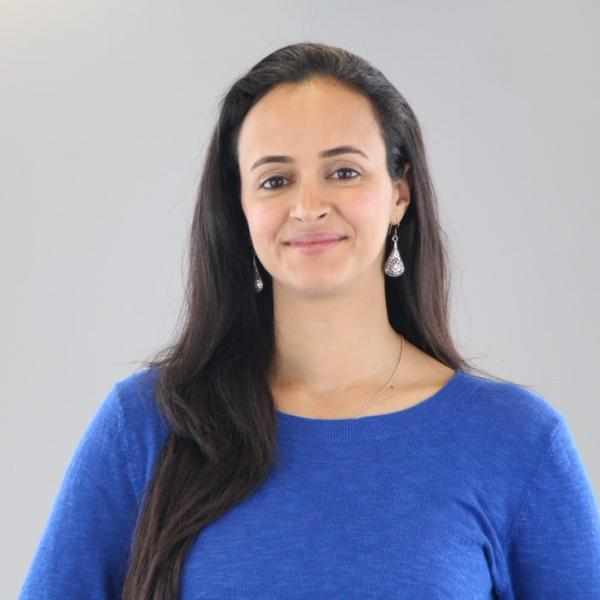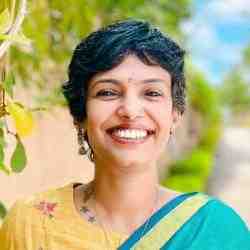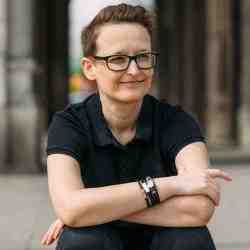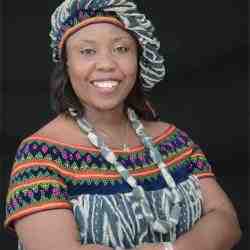Introduction
Asmaa is shifting mindsets in Muslim families, Muslim communities, and secular institutions to bridge the different ways of being so that women and girls can be devoted to Islam while living at peace with their multiple identities.
The New Idea
The daily experience of Muslim women living in secular societies is for many like living in a perpetual state of contortion: Islam is on one side, and Western society and culture are on the other. Asmaa is pioneering an anti-discrimination model that channels the lived experiences of Muslim women to create momentum for transformation that can find expression in faith-based and secular circles alike. She is giving many of these Muslim women and girls a chance to reconcile their multiple identities and value systems so they can withstand the pressures they experience from different world views.
Asmaa is building a new generation of Muslim women by enabling them to master an anti-oppressive discourse to counter the multiple social and cultural obstacles that impede their flourishing as human beings. Her model centers on Muslim women and girls, creating an environment where programs are delivered for and by Muslim women - a first in French Canada. But Asmaa’s new idea really lies in her unique ability to tackle the problem in a systemic way, working across concentric rings of influence. Realizing that it is not enough to engage with Muslim women and girls directly, she is also working with Muslim families, communities (including religious leaders), and secular institutions to transform the different environments where Muslim women and girls learn, work, and live.
Her series of programs are designed to develop knowledge, critical thinking, and leadership on decolonial and anti-oppression approaches and practices. With this newly acquired understanding, these individuals are now better equipped to foster change and provide solutions in environments in which they evolved such as households, workplaces, schools, Muslim communities, and society at large. Working from this centerpiece, Asmaa has also developed a range of tools and resources to transform the different actors involved in a Muslim girl’s life: the family, the community, and institutions such as civic societies and service providers. With current endorsements in place with the city of Montreal, Asmaa has been approached by representatives of other regions to collaborate and scale her model. As a member of a broader global network seeking to overcome stagnating discourses surrounding Muslim women, Asmaa will next look to scale her idea and its impact internationally over the next couple of years.
The Problem
In the unique context of Quebec, living as a racialized person means experiencing life as a minority within a majority population that considers itself a minority, too. While white francophone culture is dominant in Quebec, it represents a minority in the broader perimeters of Canada. This dynamic can be traced back to Quebec’s Quiet Revolution (Révolution tranquille) of the 1960s, a period of intense socio-political and socio-cultural change characterized by the secularization of the provincial government and the public sector. The events of that period led to a sharp turn towards secularism in the province, and a systemic rejection of religious ideologies.
Today, secularist sentiments often portray Muslim communities, and more particularly Muslim women, as the antithesis of progress. According to a 2017 poll reported by Ici Radio-Canada (Canada’s French language national public broadcaster), suspicion of “non-integration” towards immigrants and minority groups is much more pronounced when it comes to religious minorities, especially those of Muslim faith. Based on the poll, Muslim people are perceived as being poorly integrated (by 38% of respondents) and very poorly integrated (by 19% of respondents), as compared to perceptions about other communities. Moreover, according to the same poll, 32% of Quebecers would like the government to ban Muslim immigration and 62% see the headscarf worn by Muslim women as a sign of submission. These statistics highlight popular Islamophobic and xenophobic attitudes in Quebec.
Over the past 20 years, Quebec has witnessed notable events characterized by anti-Muslim bias. More recently, in the Spring of 2019, Quebec passed Bill-21 (secularism law) which actively prohibits teachers, lawyers, police officers, and other public sector workers from wearing religious symbols such as hijabs, crosses, yarmulkes, and turbans. While these legislative efforts impact a variety of racialized citizens, Muslim women are disproportionately affected by the broader secular agenda. Not only does this impact Muslim women currently working in the public sector. Younger Muslim women and girls who aspire to such careers are also forced to find alternative employment options or leave the province and their homes, families, and communities to pursue their aspirations.
Within the secular francophone context, Muslim women exist at the intersection of two systems of domination. On the one hand, there are patriarchal traditions and practices within some Muslim communities. On the other hand, there is a secular agenda compounded by Islamophobic and overall gendered racism in Quebec (although Catholic symbols continue to be widely accepted, as evidenced by a crucifix on display at the National Assembly – a phenomenon referred to as catho-laïcité). For many Muslim girls, the world they are experiencing in the state’s school system is different from the world experienced in the Muslim household. This may lead to a cycle of continuous intergenerational tension and disconnection in Muslim families. Muslim parents are concerned about protecting their girls’ security in a new context and maintaining faith and cultural traditions while also wanting their daughters to succeed in society. Muslim girls and teenagers, meanwhile, are slowly developing multiple dimensions to their identity, including Quebec’s cultural values. As a result, Muslim women’s bodies have historically been turned into territories of conflict which leave them with limited options: relinquishing their agency to decide what they want to do and become or fight against the systems of domination and risk alienation. The daily experiences of these women and girls can be summarized by a perpetual contortion of their identity; wherever they are, they must tailor their thoughts, feelings, emotions, and opinions to any given situation without the power to fully be themselves.
The Strategy
Having grown up as a Muslim teenager in Quebec since the age of 14, Asmaa’s apprenticeship years allowed her to understand the unique challenges facing Muslim women and girls living in secular societies. Having been part of a global Muslim movement, she acted as representative of the Muslim Presence Association in Quebec, and travelled to many parts of the world as an aid worker. She knew that public institutions, media outlets, and societies at large can easily subvert any Muslim organization in the name of secularism.
After many years of careful planning, Asmaa founded Institut F with the mission to promote the fulfillment and flourishing of Muslim women and girls of diverse origins. Administered by and for Muslim women, Asmaa acknowledges that engaging Muslim women to develop programs and initiatives is the key piece in her accountability framework. From there, she targets the other rings of influence: families, communities, and institutions. Her organization is the only one in Quebec that works from a perspective based on references drawn from Muslim history and spirituality. She is doing so while considering the multiple points of convergence between religious references and secular concepts and approaches related to gender equality. Asmaa is creating safe spaces of solidarity that allow Muslim women to reflect together - the only space of this kind for many of these women. With Institut F, she is fostering a shared power that grows out of collaboration and relationships, and which in turn generates the ability for those Muslim women to learn and act together.
Cultiver un leadership d’excellence (CLE) is Asmaa’s cross-sector development program for Muslim women and girls that takes individuals on a transformative learning journey so they can become changemakers in different dimensions of their lives. The objective is to help them master an anti-oppressive discourse in the pursuit of removing barriers that impede their progress. Aside from leadership skill training, Asmaa is leveraging her creativity in putting participants in different situations where race, gender, faith, and other power dynamics are at play. These Muslim women and girls can exercise equity dialogues without fear of making mistakes or being reprimanded, and in the process, they develop a critical understanding of issues and dynamics they encounter on a regular basis. With this newly acquired understanding, these individuals are now better equipped to foster change and provide solutions in environments in which they evolved such as households, workplaces, schools, Muslim communities, and society at large. This leadership program is complemented by other programs such as Réussir la pluralité (RP) which dives deeper into the intercultural and race dynamics in organizational settings; and RISE (Réflexions autour de l’Islam, la Société et l’Empowerment des femmes) which focuses on religious text centering the women’s roles in Islam and in society. Asmaa has received many testimonies from previous program participants detailing how they managed to secure promotions and navigate difficult conversations in their workplace and school.
The ring of influence closest to the Muslim girl is the immediate family. As part of her system changing approach, Asmaa is transforming what happens within the Muslim household. Her program ‘En famille, en harmonie’ provides family members (parents and their children) opportunities to learn about how sexism and racism are manifested in their lives in a culturally relevant manner. She leverages different creative methods such as humorous videos, family dialogue, and in the future peer-to-peer (i.e., male only) conversations to foster mindset shift. In instances where traction proves difficult, Asmaa plans to use male ambassadors of her work to influence other men that may be reluctant to adopt this new mindset. Overall, this approach allows families to better support one another with a common understanding that Muslim children (especially Muslim girls) often experience discrimination in different spheres of their lives (at school, at work, and even at home). In focusing on families, Asmaa is fostering positive environments for Muslim women and girls.
The next ring of influence involves religious gatekeepers. Since 2018, Asmaa has been working with imams (Muslim scholars) through Textes et Contextes, which is a program designed to promote dialogue between Muslim women and imams outside of mosques. This is how she is fostering introspective learning opportunities for imams to see and understand Canadian Muslim women’s position as religious racialized women living in a secular society. Building relationships with imams enables Asmaa to create spaces and opportunities for Muslim women’s inclusion in decision-making settings within Islamic institutions. These highly influential imams each have a few thousand regular followers during public gatherings and lead weekly prayers for about 600 people. They not only share Asmaa’s values but are also enabling Muslim women to speak and share their perspectives in faith-based gatherings.
A unique aspect of Asmaa’s innovation lies in her ability to target a variety of stakeholder groups. While the primary beneficiaries of her work are Muslim women and girls, she understands that changing the system requires close collaboration with a constellation of allies and partners. Currently, Institut F is partnering with more than 25 organizations, including La Table des groups de femmes de Montreal, the mission of which is to promote and defend the interests of women from a feminist perspective of gender equality. Representatives from the City of Montreal, public schools, police services, libraries, and other institutions have participated in her allyship programs. Tailored to each sector, Asmaa’s objective with these programs is to bring service providers and Muslim women together to converse. Centered on lived experiences, these conversations allow service providers to better understand how their service delivery methods often negatively impact Muslim women and girls. After going through Asmaa’s program, around 75% of participants from institutions have expressed that they would be willing to change and co-design practices when engaging with immigrant and racialized women. For those who were previously involved in the CLE program, these allyship conversations create opportunities for Muslim women to step into roles with an enhanced capacity to promote anti-oppression frameworks.
Since founding Institut F in 2017, Asmaa has reached more than 1,500 Muslim women, girls, and family members; created a range of tools, resources and formats for the various target groups; and built a network of trainers. Each program is conducted over the course of several months as part of her scaling deep strategy to change cultural belief and practices. The cascading effects of her work carry on through other families and community members and enable Muslim mothers to promote similar values with their children. Asmaa is unlocking the power of Muslim women, girls, and community allies to multiply her impact in building a new generation of Muslim women who can identify, navigate, and work against the systems that dominate their lives. Through this scaling deep strategy, Asmaa can be described as a patient teacher in this pattern of change: she is patiently taking people through changes in habit, outlook, understanding, and attitude.
With current endorsements from the City of Montreal, Asmaa has been approached by different municipalities to spread her model. Over the next few years, she seeks to target all mosques in the province of Quebec by joining forces with imams who are open for dialogue. With momentum, she wishes to identify even more points of convergence to engage other Muslim leaders. From her apprenticeship years, Asmaa has developed relationships with international networks for Muslim women dealing with issues of intercultural dynamics and race relations in Africa, France, and beyond. Part of her long-term objectives is to gradually leverage this network and build a strong reputation to attract various coalitions globally that lead movements promoting plurality of identity and self-efficacy.
The Person
Born in Morocco, Asmaa and her family immigrated to Canada when she was 14 years old. Like many other francophone immigrants, they settled in Montreal, Quebec. Asmaa experienced racism, sexism, and Islamophobia at school and in the workplace. Simultaneously, she was trapped in the intergenerational tensions in her household. While her parents had deep cultural roots in Morocco, Asmaa was slowly anchoring hers in Quebec. For many years, Asmaa felt as if she belonged to two incompatible worlds: Islam on one side and Quebec society and culture on the other.
From the age of 14, Asmaa was volunteering in different initiatives within her community and at school. She later joined international solidarity projects through Québec Sans Frontières which opened doors for a career in the aid sector. Asmaa worked in various humanitarian aid organizations, notably UNICEF, UNHCR, Save the Children, Action Against Hunger, and World Vision. Between her humanitarian missions and civic engagements, Asmaa has worked in over 15 countries - hence her in-depth understanding of the political manipulation of Islam and the oppression of Muslim women in secular contexts. Since 2008, she has been involved with an International Group for the Study and Reflection on Women in Islam (GIERFI), which offers diverse feminist voices the opportunity to discuss issues concerning their rights, responsibilities, and roles to overcome the stagnating dialogue surrounding Muslim women.
When she was not working overseas, Asmaa campaigned for the emancipation of Muslim women by mobilizing communities and speaking on live television in Quebec. She also authored the book Chroniques d'une musulmane indignée and designed a university level course. The thread running through all her work has been Islamic feminism. Having experienced an intense period of spiritual reflection during her time in Africa on humanitarian missions, Asmaa realized after many years that she does not have to choose to belong within one group or another. Plurality of identity is at the heart of who she is and what she is trying to accomplish for other Muslim women. Her long apprenticeship period has allowed her to create Institut F and promote the fulfillment and flourishing of Muslim women and girls of diverse origins. Asmaa defines herself today as a woman who is Quebecer, Moroccan, Muslim, and empowered.




